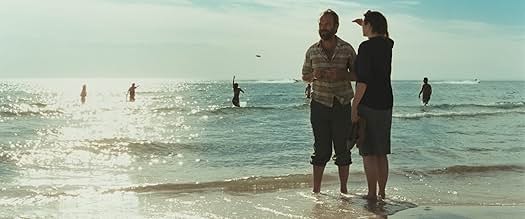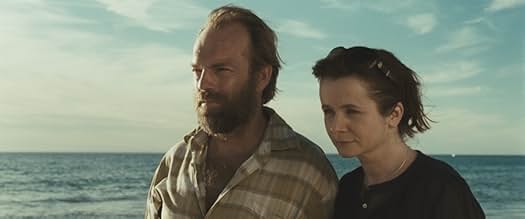IMDb-BEWERTUNG
7,1/10
6094
IHRE BEWERTUNG
Füge eine Handlung in deiner Sprache hinzuSet in 1980s Nottingham, social worker Margaret Humphreys holds the British government accountable for child migration schemes and reunites the children involved -- now adults living mostly ... Alles lesenSet in 1980s Nottingham, social worker Margaret Humphreys holds the British government accountable for child migration schemes and reunites the children involved -- now adults living mostly in Australia -- with their parents in Britain.Set in 1980s Nottingham, social worker Margaret Humphreys holds the British government accountable for child migration schemes and reunites the children involved -- now adults living mostly in Australia -- with their parents in Britain.
- Regie
- Drehbuch
- Hauptbesetzung
- Auszeichnungen
- 10 Gewinne & 21 Nominierungen insgesamt
Heath Tammy
- Susan
- (as Tammy Wakefield)
Alastair G. Cumming
- Australia House Official
- (as Alistair Cummings)
Empfohlene Bewertungen
I caught this film as part of the Glasgow Film Festival and I'm glad that I did. Knowing very little of the story about the the organised deportation of children in care from the United Kingdom to Australia, I found much of this film was shocking and upsetting. This film concentrates on Margaret Humphrys, the social worker who uncovers this scandal. Under her own steam and then with the support of her employer, Margaret discovers that more than just a few children were deported. She makes it her mission to help those deportees who wish to find out about the families they were forced to leave behind. This proves to be no easy task as the British government stonewall her and provide no help with the details of the deportees or their families. No deliberate attempt is made to overplay the injustice or high emotions running through the story; it is told in a simple, straightforward and affecting manner and it is all the more powerful for that. Take some time out and go and see this film as it's one that deserves a wide audience and stay to the end as that's when the viewer finds out when an apology for this very sad situation was given.
Carronas' review could not be more wrong! She could not even get the directors name right. It's JIM not LEN Loach, and the rest of the review is just as inaccurate. I had no trouble following the story line even without any prior knowledge of the events. I had no trouble understanding where each scene was set, be it UK or Oz, it was perfectly clear which was which. The film stock helped to give that dated feel of the 1980's and this was further enhanced by the vehicles, furniture and fashions. The lack of dialogue in certain scenes (meeting the Brothers) added tension where words would have added nothing. This was an excellent film, well filmed and well acted. See it and enjoy.
Oranges and Sunshine – CATCH IT (B+) The film tells the story of Margaret Humphreys, a social worker from Nottingham who uncovered the scandal of "home children", a scheme of forcibly relocating poor children from the UK to Australia and Canada. Margaret reunites estranged families and brings worldwide attention to the cause. Deported children were promised oranges and sunshine but they got hard labor and life of misery and sexual abuse in institutions such as Keaney College in Bindoon, Western Australia. (Wiki) Oranges and Sunshine is a sensitive subject matter which defiantly put Britain in Shame when Margaret Humphreys broke out the story in 80s. Emily Watson's portrayal of Margaret Humphreys' trouble to help the transported kids all the way to Australia is heart wrenching. The emotional turmoil she goes to work for them while managing her family is something really inspiring. Emily Watson is a great actress and no doubt she brings her emotional range to the real life role model. In supporting cast Hugo Weaving & David Wenhem did a fine job. Overall, it's a sensitive movie about a sensitive issue. Keep in mind its tear jerker, so keep a box of tissue.
It is always a jolt when a bit of buried history surfaces and makes us realize that the world is not all that sane as we would like to believe: the Chaos Factor raises its ugly head as in this screen adaptation by Rona Munro of Margaret Humphreys' true story book 'Empty Cradles'. This is a very powerful film, all the more so because of the quality of acting and direction by Jim Loach who never lets the film run out of control despite the unveiling tragedy.
The story is set in the 1980s where Nottingham, social worker Margaret Humphreys (Emily Watson) is a social worker who encounters a middle aged woman who has traveled form Australia to find her birth parents. Margaret at first doesn't want to increase her workload with a wild tale of children having been deported form England by ship to be placed in orphanage work camps in Australia, but with the aid of her supportive husband Merv (Richard Dillane) she begins to investigate the uncovered secret, ultimately traveling to Australia where she meets the 'unwanted children' as adults each longing to return to the UK to meet their families. The children when deported were as young as four to thirteen years old and had been told their parents either were dead or didn't want them and the representatives from the government promised them a safe home with 'oranges and sunshine' in Australia. There are several 'victims' as played by Hugo Weaving, David Wenham, Russell Dykstra and others who help personalize the unspoken crime until Margaret progresses to the point where she can hold the British government accountable for child migration schemes and reunite the children involved -- now adults living mostly in Australia -- with their parents in Britain. Though the deportations occurred from the 1940's through the 1970's it was only after Margaret Humphrey's 1994 book and then much later after when February 2010 Great Britain's Prime Minister Gordon Brown finally issued a full apology to those deported children and their families.
The supporting cast is uniformly excellent but it is the glowing performance by Emily Watson that makes this revelation of a film remain in the mind long after the credits explain how the solution played out in reality. This is a tough film but an important one and deserves a much larger audience than it has found.
Grady Harp
The story is set in the 1980s where Nottingham, social worker Margaret Humphreys (Emily Watson) is a social worker who encounters a middle aged woman who has traveled form Australia to find her birth parents. Margaret at first doesn't want to increase her workload with a wild tale of children having been deported form England by ship to be placed in orphanage work camps in Australia, but with the aid of her supportive husband Merv (Richard Dillane) she begins to investigate the uncovered secret, ultimately traveling to Australia where she meets the 'unwanted children' as adults each longing to return to the UK to meet their families. The children when deported were as young as four to thirteen years old and had been told their parents either were dead or didn't want them and the representatives from the government promised them a safe home with 'oranges and sunshine' in Australia. There are several 'victims' as played by Hugo Weaving, David Wenham, Russell Dykstra and others who help personalize the unspoken crime until Margaret progresses to the point where she can hold the British government accountable for child migration schemes and reunite the children involved -- now adults living mostly in Australia -- with their parents in Britain. Though the deportations occurred from the 1940's through the 1970's it was only after Margaret Humphrey's 1994 book and then much later after when February 2010 Great Britain's Prime Minister Gordon Brown finally issued a full apology to those deported children and their families.
The supporting cast is uniformly excellent but it is the glowing performance by Emily Watson that makes this revelation of a film remain in the mind long after the credits explain how the solution played out in reality. This is a tough film but an important one and deserves a much larger audience than it has found.
Grady Harp
Oranges and Sunshine is directed by Jim Loach and adapted to screenplay by Rona Munro from the book "Empty Cradles", written by Margaret Humphreys. It stars Emily Watson, Hugo Weaving, David Wenham and Richard Dillane. Music is by Lisa Gerrard and cinematography by Denson Baker. The film tells the true story of Margaret Humphreys (Watson), a Nottingham social worker who in 1986 began uncovering the scandal of forced child migration from the UK to various countries of the Commonwealth. Thousands upon thousands of children who were either from poor families or orphaned, were sent to British colonies under a banner of lies. Where instead of the oranges and sunshine they were expecting, they were put to work as hard labour and suffered terrible conditions to live in as well as abuse at the hands of their carers.
Lost Children Of The Empire.
It's a story ripe for exploitation, for a bit of shock cinema, the kind that assaults you with horrific images, but Oranges and Sunshine is a rare beast, a true life horror tale that accentuates the outrage by remaining understated and steady in sombre tone. This is expert film making from Loach (son of Ken), letting the story unfold with a naturalism that makes it a deeply moving experience. No histrionic characterisations by the actors, no grandstanding speeches or attempts to paint Margaret Humphreys as an armour plated crusader risking death at every turn. It's cold, yet humane, in its telling, the pain of story etched on the faces of the lost children, now adults searching for identity and a family thread to stitch it together. The emotional uplift of the reunion scenes gladdens the heart, but never once does the film proclaim, like its wonderful protagonist, that what has been lost can be replaced. But identity is comforting, the fragmented pieces of childhoods ruined finally piecing themselves together.
Who was crucified huh? You tell me that.
Thankfully the makers resist, rightly, the urge to show flashback scenes of the children suffering. We know just by dialogue exchanges and character reactions, just what pain and misery was bestowed upon these minors. Yet the film is full of powerful scenes that really grip and hold the heart, where quite often they are just quiet conversations, a statement made or a question asked. Or even in silence for one truly potent sequence as Margaret visits Bindoon Boys Town in Western Australia, an imposing, but elegant structure on the outside, but that elegance belies the terrible crimes perpetrated by the cleric elders within. Loach and his team don't need tricks or historical tampering to make their film dramatic and worthy, the story sells itself on both counts.
Oh, baby, baby, it's a wild world.
Picture is propelled by a wonderfully restrained performance by Watson. A perfect bit of casting, Watson never screams for our sympathies, she hits the right emotional notes required, but never strains to get there, she plays Margaret as a bastion of decency. She deftly blends stoicism with vulnerability as Margaret juggles the emotional strains of the search with that of the safe haven of her family home that she is away from for long periods. Watson is surrounded by three damn fine male performances. Weaving and Wenham as the "lost boys" underpin the story, they perfectly embody the crushing of the childhood spirit, a two pronged acting show that says so much for the thousands of children who were cruel victims of the child migration schemes. Dillane scores high as Margaret's husband, he perfectly understands the tone of the movie and turns in a respectful and appropriate performance as Margaret's loving crutch.
It's not all perfect, Margaret is met with some resistance and finds herself in a couple of tricky situations, but the evil nature of the wrong-doers never fully surfaces to give her a formidable foe to respond too. Nor is anyone made accountable for their heinous crimes, something which leaves a frustrating taste in the mouth. However, the point of the movie, the attention brought to the story it's about and the skill with which said story is told, ensures that these are just minor quibbles in one of the best movies of the year. 9/10
Lost Children Of The Empire.
It's a story ripe for exploitation, for a bit of shock cinema, the kind that assaults you with horrific images, but Oranges and Sunshine is a rare beast, a true life horror tale that accentuates the outrage by remaining understated and steady in sombre tone. This is expert film making from Loach (son of Ken), letting the story unfold with a naturalism that makes it a deeply moving experience. No histrionic characterisations by the actors, no grandstanding speeches or attempts to paint Margaret Humphreys as an armour plated crusader risking death at every turn. It's cold, yet humane, in its telling, the pain of story etched on the faces of the lost children, now adults searching for identity and a family thread to stitch it together. The emotional uplift of the reunion scenes gladdens the heart, but never once does the film proclaim, like its wonderful protagonist, that what has been lost can be replaced. But identity is comforting, the fragmented pieces of childhoods ruined finally piecing themselves together.
Who was crucified huh? You tell me that.
Thankfully the makers resist, rightly, the urge to show flashback scenes of the children suffering. We know just by dialogue exchanges and character reactions, just what pain and misery was bestowed upon these minors. Yet the film is full of powerful scenes that really grip and hold the heart, where quite often they are just quiet conversations, a statement made or a question asked. Or even in silence for one truly potent sequence as Margaret visits Bindoon Boys Town in Western Australia, an imposing, but elegant structure on the outside, but that elegance belies the terrible crimes perpetrated by the cleric elders within. Loach and his team don't need tricks or historical tampering to make their film dramatic and worthy, the story sells itself on both counts.
Oh, baby, baby, it's a wild world.
Picture is propelled by a wonderfully restrained performance by Watson. A perfect bit of casting, Watson never screams for our sympathies, she hits the right emotional notes required, but never strains to get there, she plays Margaret as a bastion of decency. She deftly blends stoicism with vulnerability as Margaret juggles the emotional strains of the search with that of the safe haven of her family home that she is away from for long periods. Watson is surrounded by three damn fine male performances. Weaving and Wenham as the "lost boys" underpin the story, they perfectly embody the crushing of the childhood spirit, a two pronged acting show that says so much for the thousands of children who were cruel victims of the child migration schemes. Dillane scores high as Margaret's husband, he perfectly understands the tone of the movie and turns in a respectful and appropriate performance as Margaret's loving crutch.
It's not all perfect, Margaret is met with some resistance and finds herself in a couple of tricky situations, but the evil nature of the wrong-doers never fully surfaces to give her a formidable foe to respond too. Nor is anyone made accountable for their heinous crimes, something which leaves a frustrating taste in the mouth. However, the point of the movie, the attention brought to the story it's about and the skill with which said story is told, ensures that these are just minor quibbles in one of the best movies of the year. 9/10
Wusstest du schon
- WissenswertesBased on true events, Margaret Humphreys was awarded the Medal of the Order of Australia in 1993, and awarded Commander of the British Empire in 2011 for her work.
- PatzerWhen Margaret is searching through the Public Records of Births and Marriages each entry gives full details, is handwritten, and sorted by town and presented in chronological order. In reality, to protect data they are single-line typed entries giving basics and references for obtaining full details, for anywhere in the country, and sorted alphabetically by surname for each quarter of the year.
- VerbindungenFeatured in Breakfast: Folge vom 23. März 2011 (2011)
- SoundtracksWild World
Written and performed by Cat Stevens
Courtesy of Universal-Island Records Ltd
Courtesy of Universal Music Operations Ltd
Published by EMI Music Publishing Ltd
Top-Auswahl
Melde dich zum Bewerten an und greife auf die Watchlist für personalisierte Empfehlungen zu.
- How long is Oranges and Sunshine?Powered by Alexa
Details
- Erscheinungsdatum
- Herkunftsländer
- Offizielle Standorte
- Sprache
- Auch bekannt als
- Oranges & Sunshine
- Drehorte
- Adelaide, South Australia, Australien(location)
- Produktionsfirmen
- Weitere beteiligte Unternehmen bei IMDbPro anzeigen
Box Office
- Budget
- 4.500.000 $ (geschätzt)
- Bruttoertrag in den USA und Kanada
- 143.480 $
- Eröffnungswochenende in den USA und in Kanada
- 18.600 $
- 23. Okt. 2011
- Weltweiter Bruttoertrag
- 5.017.653 $
- Laufzeit1 Stunde 45 Minuten
- Farbe
- Sound-Mix
- Seitenverhältnis
- 2.35 : 1
Zu dieser Seite beitragen
Bearbeitung vorschlagen oder fehlenden Inhalt hinzufügen

Oberste Lücke
By what name was Oranges and Sunshine (2010) officially released in India in English?
Antwort



































